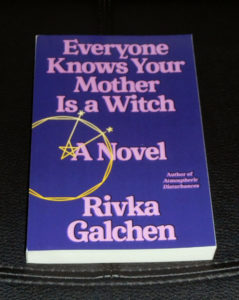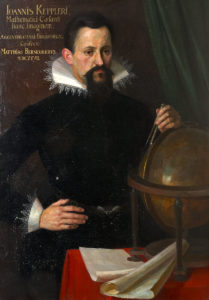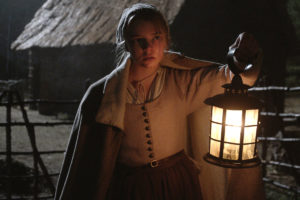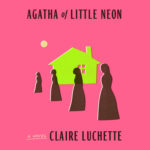
Summer’s End
Everyone Knows Your Mother is a Witch by Rivka Galchen was one of two great books that closed out my summer reading. This book should also be in the running for Best Book Title of 2021. If you’ve got a better one, let me know.
I am not typically a fan of historical fiction. If it is well written I usually end up feeling betrayed when reminded I am not reading an authentic source. But Galchen used historical documents as the basis of her story and that eased my hesitation (plus let me say it one more time, the title was enough to prod me into opening the book).
Everyone Knows Your Mother is a Witch takes place in the early 1600s in a small German town called Leonberg. Times are tough; the plague is spreading, the Thirty Years War is just spinning up, and Germans remain wary of Catholics, which fuels conspiracy theories and general paranoia. Bad times are ever-present and days are saturated with inconveniences and troubles. People are hungry, grumpy, and poorly educated. It’s not hard then to imagine how the grim citizens of Leonberg felt about Katherina Kepler, a widow who appeared to be doing a-ok through it all despite her eccentricities.
Katherina is known about town for her herbal remedies, her love of goats, and her low opinions of the fancy townsfolk as evidenced by her smart-assed monikers for them (‘the Cabbage’, ‘the False Unicorn’, ‘the Werewolf’). It doesn’t help her reputation either that her children are successful through good marriages and political maneuvering. Her eldest son, Johannes, became the Imperial Mathematician and discovered and wrote about the laws that governed planetary motion. Big stuff. The stuff of Wikipedia entries 400 years later.

Still it is no surprise when a neighbor accuses Katherina of having given her a witch-conjured drink that made her sickly and her leg ache. This initial accusation is the perfect match to a tinder pile built on years of brittle feelings. Katherina’s only allies during her trial are her children and one neighbor. Galchen weaves the story together from the alternating perspectives of Katharina, her neighbor Simon, and the weaselly townspeople who testify against Katherina – and do so with gusto in hopes of gaining some of her wealth if there is a conviction.
Katherina’s narration is humorous and biting throughout, even though her situation is dire – if convicted she’ll be tortured and burned. The townspeople’s fears and superstitions are laughable as they provide testimony at Katerina’s trial. It’s laughable until the reader realizes our country recently lived through four years of tweets about ‘the Greatest Witch Hunt Ever’ from our President who was able to incite a similar mob mentality. I guess we haven’t come that far in 400 years.
Galchen builds an immersive sense of time and place in this book. And you will root for Katherina even though she is accused of such horrific crimes as riding goats backwards, coating human skulls with silver, and throwing evil eyes every which way.
Since long winter nights are around the corner I have a suggested movie accompaniment to Everyone Knows Your Mother is a Witch: It’s the 2016 movie, The Witch. The movie is set in the same time period as Everyone Knows Your Mother is a Witch – only it takes place on (to-be) US soil. The movie, like Galchen’s book, creates a strong sense of what the world was like when belief in witchcraft was ubiquitous. Once the movie sets the worldview we then are drawn into all the spooky feels of the 12-year-old who has to step out to feed the family pig -named Black Phillip. On her own. In the gloaming. In the middle of the woods.

Margot Livesey wrote one of my all-time favorite novels, Eva Moves the Furniture. And because of that I pick up her books when I can. She has written another perfect novel in my opinion, The Boy in the Field, and it was the second great book I read this summer. The book is a mystery centered on a wounded boy found in a field who had been left for dead.
I promise you this, Livesey’s writing is vibrant, it sparkles. There is no filler, no words are wasted which means you can’t take your eyes off the page or allow your mind to wander lest you’ll miss a crucial image or insight.
The Boy in the Field is told through the alternating voices of the three siblings who found the boy. For each one, Matthew, Zoe, and Duncan, their world view is shaken on the day they find the boy. All three are awakened to the fact that the world is a violent place and despite their idyllic lives lived in a quaint village with loving parents, there is no guarantee of their continued safety.
As the investigation begins, the siblings are forbidden to discuss the crime with anyone so they start individual journeys to make sense of this newly dangerous world. Matthew, the oldest child, begins the footwork of an obsessive investigation. He searches the field, interviews people, and makes regular appointments with the lead detective on the case (it’s England, I guess cops talk to 17 year old kids when working an active case). Zoe intentionally places herself into dangerous situations to assure herself she has the wherewithal to manage tricky circumstances. Duncan, the youngest and adopted child, decides he must find his birth mother.
Livesey tends to add simple touches of otherworldliness in her stories. In this one Duncan sees a ghostly vision of his birth mother as he looks out the bedroom window at night. Zoe has out of body experiences that enable her to see beneath the surface of her parent’s marriage and other facades. And the family adopts a dog who is able to communicate silently with the children at crucial moments.
I loved these siblings on their individual treks towards understanding the world more clearly and hoped their paths would be safe going. Livesey gives the reader peeks at the end of ‘where are they now’, but it is the children’s journey, not their destination that is the most meaningful. This is a perfect story perfectly written.

Here is my suggested accompaniment for The Boy in the Field. It is a BBC Mystery series called: Unforgotten. Unforgotten is a procedural series that is centered on a detective team that deals only with cold case murders. It is brilliant in its humane (not sappy) depiction of the chaos that leads to murder and the fallout that touches everyone, even those with the smallest connection.
Honorable Mentions from this summer’s reading:
 Agatha of Little Neon by Claire Luchette. Truthfully, honestly, I’ve always loved nun stories. They frequently are about community in times of chaos, which is a favorite theme. This novel does not vary from that premise. And: p.s., priests ruin almost everything and they are often creeps. Nuns, however, are always funny and delightfully naïve. These truths have been evident to Catholic school children from as early as the 1960s.
Agatha of Little Neon by Claire Luchette. Truthfully, honestly, I’ve always loved nun stories. They frequently are about community in times of chaos, which is a favorite theme. This novel does not vary from that premise. And: p.s., priests ruin almost everything and they are often creeps. Nuns, however, are always funny and delightfully naïve. These truths have been evident to Catholic school children from as early as the 1960s.
How to Kill Your Best Friend by Lexie Elliot. The answer to the title’s indirect question is: you should take some clues from past behavior and ditch said ‘best friend’ before it’s too late. But when all your best buddies have some questionable character flaws, its hard to determine who is a likely murderer. This book is set on a tropical island with a storm bearing down on a very tense situation, which is a nice twist on the English cozy mystery setup. Read it this winter when you are dying for a swim in warm turquoise water, even if a deadly serpent circles the island.
That Summer by Jennifer Weiner. Set on Cape Cod this story is about recovery from violent events and then finding an opportunity to ‘settle the score’ for something that can never ever be settled. This was a perfect summer read that takes place next to the healing ocean and in the midst of the growing #metoo movement. Weiner consistently provides a protagonist or two that you can root for all the way through.
Finally, Kittens.



